| |
Lessons learned from the Hawaii "gay marriage" fight
Moving forward . . .
POSTED: November 24, 2013
The spectacle of "gay marriage" being pushed through the Hawaii Legislature's "special session" was unlike anything we've seen elsewhere. The outpouring of effort by Hawaii citizens against it was unbelievable. The process was extraordinarily corrupt and insulting. Rarely has such a huge public opposition to a bill been so blatantly ignored by politicians. See our full Hawaii Report HERE.
But we don't believe such defeat is inevitable. There are some important lessons from this and other recent "gay marriage" battles which the pro-family movement must recognize and use productively.
[Note: Photos below were taken exclusively for MassResistance.]
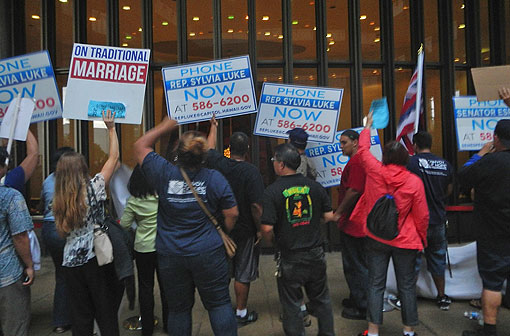
Not giving up. Pro-marriage citizens outside the gates of the Hawaii State House in the early morning hours during the special legislative session
Here's what we've observed:
1. Huge forces stacked against us in these battles
Pro-family groups enter these fights at an enormous disadvantage. The points below unfortunately have been constants in every "gay marriage" battle around the country (and in other homosexual issues). We've had to react to them (and endure them), but have not yet prepared effectivs answers to them.
- Huge, well-organized lobbying blitzkrieg by the homosexual movement.
This speeding freight train was 100% imported from the mainland. Since their original "gay marriage" victories in the Massachusetts legislature (stopping the anti-"gay marriage" constitutional amendments), the homosexual movement has gradually created a very sophisticated legislative lobbying strategy which they've used to plow through state after state. (They are also skilled at getting their legal challenges filed in courts with "ally" judges.)
They know how to lobby and how to organize their people in key districts. They know how to get their people to confront their legislators with emotional arguments. It's very daunting for local pro-family organizations to take this on.
They know how to use the state's liberal establishment to get top officials such as the governor, attorneys general, and legislative leaders to vigerously help them, while intimidating top officials in opposition from getting involved.
Their strategy is ready to export anywhere it's needed. We've seen it up close in several places and it's effective and intimidating.
- Enormous amounts of pro-homosexual money coming in.
The blitzkrieg is fueled by huge funding from big donors and corporate America, almost all of it from out of state. The funders are quite open and proud of their support. It ranges from hundreds of thousands to millions of dollars -- far bigger than any other state legislative lobbying efforts we're aware of. Some of this money is given directly to the state homosexual groups, and some is funneled to them through the national homosexual organizations such as Human Rights Campaign. Hawaii was just the latest stop on that locomotive.
- The mainstream media's non-stop PR campaign.
The homosexual movement doesn't have to buy a lot of advertisements. The veritable flood of horribly biased, misleading, and often inaccurate news and feature articles promoting "gay marriage" has become a staple in these battles. The average person is led to believe that "gay marriage" is nearly universally popular, very good for society, and inevitable. In addition, spineless and unprincipled politicians are afraid of being called names, and this leverages that perfectly.
- Almost no support from national conservative movement.
It's disgraceful. The national conservative movement and the traditionally reliable conservative donors have basically stopped opposing "gay marriage" in America. Most of that is out of cowardice (i.e., afraid of the homosexual movement), but also simply giving up the fight. So when states are threatened with big marriage fights, local pro-family groups are left to fend for themselves almost completely.
In legislative fights the National Organization for Marriage (NOM) does provide some minor support by paying for some TV ads and robocalls but not much else. (They tend to put more effort into statewide marriage ballot fights.) But much needed money for State House lobbying is rarely received from out of state.
Hawaiian citizens fought this harder than we've seen in most other places. In some ways they are in a class by themselves. But there is no question that they were up against overwhelming odds. And for the most part, they didn't see it coming and unfortunately weren't equipped to stop it.
2. What was different in Hawaii -- good and bad
The "gay marriage" battle in Hawaii was certainly different than other places we've seen:
- Massive outpouring of people from across the state
In Hawaii, the massive number of regular citizens who came out against "gay marriage" was breathtaking -- especially for a state where people rarely participate in politics at all (see below) and where traveling between islands to the State House in Oahu is difficult and expensive.
Thousands came to rallies prior to the special session. Ten thousand people came to a rally the morning of the session. Over five thousand signed up for the House hearing, over a thousand actually testified and over 24,000 written testimonies were submitted. It certainly took enormous arrogance for the politicians to ignore these people.
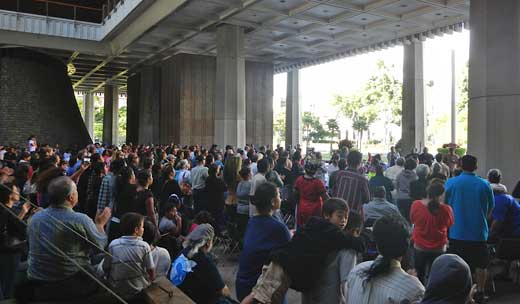
Not letting up. On Sunday afternoon, Nov. 10, hundreds of pro-family citizens filled the State House atrium area for a Solemn Assembly gathering, while they awaited the Senate vote.
- Fight organized by individual churches, small groups, and activists
In most states there is an established statewide pro-family group that takes over everything when a "gay marriage" battle comes up. But in Hawaii the churches are very strong and influential in their areas, while pro-family groups are less so. The "gay marriage" fight was entirely coordinated by a loose coalition various churches, small pro-family organizations, and individual activists -- all self-funded (as far as we could tell).
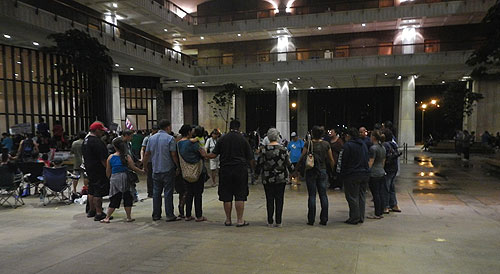
Strong religious presence. In the evening hours on Nov. 6, awaiting the House vote, people gathered in the State House atrium for prayer.
- Lowest voter turnout in America -- and its effect on politicians
Hawaii is consistently rated as having the lowest voter turnout and the least amount of citizen political participation in America. Hawaii has small legislative districts, thus a small group of people -- such as a special interest group -- can have an inordinate amount of influence on politicians seeking re-election. Since the legislature is overwhelmingly Democrat, it's likely that the far-left Democrat base which is usually the most active puts forth a lot of candidates and calls a lot of the shots once they're elected. Thus, there's a disconnect from many regular citizens.
 |
No power to the people. Signs like this were everywhere. A large part of the public hearing testimony was taken up by people who pleaded for the right to vote on "gay marriage." They felt (with justification) that the 1998 Constitutional Amendment on marriage was being subverted. But their pleas were completely ignored by their legislature. |
That's a recipe for arrogance. Politicians in Hawaii are thus much less afraid of a voter backlash for anything they might do. Since the state is basically controlled by the left wing of the Democrat Party, while a large part of the population is socially conservative, this adds to the disconnect.
Hawaii is a curious place politically: A lot of socially conservative people are "represented" by radical liberals. There is low political participation, but was a huge outpouring on this issue. Judging from the reaction of the legislators, it was quite a shock for them to see so many people drawn by this one issue. In fact, the House hearing on the "gay marriage" bill was described by the committee chairman as the largest public hearing in the state's history!
3. What we must learn from Hawaii & other recent marriage battles
The conclusions we've drawn from what happened in Hawaii and other recent states may surprise you. And we should have recognized a lot of this much earlier. Despite all the gloom, there are reasons to be positive, even optimistic, about turning the tide after these recent "gay marriage" defeats in state legislatures.
- The "gay marriage" legislative victories are politically shallow.
The homosexual movement loves to trumpet how each state's "gay marriage" legislative victory is a sure sign that society is inexorably changing in their direction.
But in fact, the "gay marriage" successes in state legislatures are not grounded in any "natural" political process. If they were not propelled by an extraordinary amount of money, power, and well-honed hard-core political strategy, all those bills would have gone nowhere. The Hawaii bill that died last February -- during the regular session -- is a case in point, compared to the super-charged situation in the Oct. 28 special session, where it was pushed through. If "gay marriage" bills had the normal amount of lobbying that generally accompanies special-interest bills, they would still be unlikely to succeed even in "blue" states.
What does this mean? It requires an enormous amount of work for the radicals to pass these bills, and their plans must be fairly well coordinated. In the future we need to put together the tools to derail their political machine before it can gain momentum.
- Our natural strength is in numbers of people. We must leverage that.
We may not have more money or media power. But there are always far more pro-family citizens than pro-homosexual activists, usually by a large order of magnitude. We need to leverage that.
The enormous and powerful outpouring by the people in Hawaii should really open our eyes. We need to learn what it takes to replicate it everywhere else. We can use various creative ways to do it.
(For example, groups of constituents could have been a frequent presence in their legislators' offices (or in their districts) starting in August when the special session was announced.)
The homosexual lobby usually has the same bunch doing everything. Their small numbers are much more obsessed and better organized, so they have been able to be more effective than we have and give the impression that they have larger support than they do. But we believe that can change.
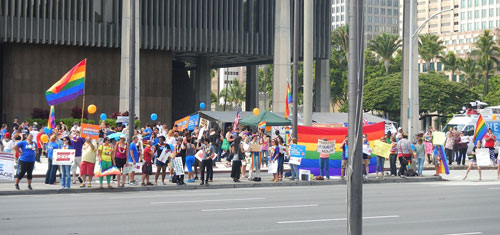
Fewer actual people. This was one of the larger gatherings by the homosexual activists outside the Hawaii State House. And many of these people, we were told, appeared to be brought in from the mainland. Their demonstrations were dwarfed by massive pro-family crowds.
- Our political message has become our weakness. We must make it our strength.
Most pro-family campaigns against "gay marriage" are weighed down by terribly weak arguments. It was particularly refreshing to see how fearless the Hawaii people were when testifying before the Legislature. By and large, they didn't fall back on the wishy-washy rhetoric we normally see. They ignored "political correctness" and simply told the truth from their hearts. In other words, they weren't afraid. We need to start from there.
Homosexuals always flood politicians with the same absurd but effective emotional messages: Civil rights, being on "the right side of history," loving couples, marriage equality, blah blah blah. Unbelievably, our side almost never counters those arguments, so they are allowed to stand uncontested in the minds of legislators. Instead, in every state we usually offer the same milquetoast arguments: traditional marriage, religious freedom, every child needing a father and mother, civil unions are already in place, etc.
These feel good for us to say and are usually "safe." But they don't work and are sometimes illogical. And the homosexual activists eat our lunch every time. We have MUCH better arguments, if we simply had the guts to use them.
We can start by completely discrediting their arguments. If that doesn't happen, we can't move forward. From there, we can go in many effective directions. for example, why doesn't our side describe the consequences of the whole range of range of "gay" issues and behaviors (especially the health risks)? We must rachet up the emphasis on what this does to children in schools. And why are we afraid to talk boldly about morality and religion?
What we're doing now is simply not working. And their arguments are so nonsensical. We should be winning that fight every time.
- Rallies and public hearings, though exciting, are not very effective. We can do powerful lobbying instead if organized.
Big rallies and public hearing turnouts are exciting, but they rarely have any effect on the legislators themselves. The events in Hawaii were wonderful to watch. But there is nothing quite like talking to someone face to face. That's why the homosexuals focus on intense personal contact, using both lobbyists and strategic use of constituents.
Obviously this won't work with every legislator. But their lobbying doesn't either. But it's by far the most effective. But it must be done properly and relentlessly.
We can outdo them at this. We have more people. The places where our side has done it well (e.g., Maryland and Illinois) have had some undeniable success. But right now, most pro-family people don't have the tools to do it, which leads to our next point . . .
- There is no solid conservative strategy. We must come up with one.
As described above, over the last several years the homosexuals have developed a unified hard-hitting, effective legislative strategy that they replicate from state to state. Our side is always left trying to figure something out on the fly.
We need to craft a solid top-to-bottom strategy that will effectively counter the homosexual movement's blitzkrieg lobbying and propaganda machine -- that uses our strengths properly and minimizes our weaknesses.
Much of this requires that we throw away our fears and understand what will work, rather than what we're "comfortable" with. This does not have to be sleazy or unethical. It takes being honest and unafraid. After all, we do have the truth on our side!
The homosexuals also figured out that this must be done by serious political people, not casual activists. That could be a difficult change for us.
Too often, we leave the important strategy to faith-based organizations, both local and national. It's a bad fit. Churches and faith organizations are wonderful for bringing people closer to God, strengthening families, studying the Bible, etc. And they're outstanding for energizing and mobilizing people on these issues. They certainly have their place in this fight. But they are usually terrible at hardball political strategy, and have been for decades. (We apologize if this offends people, but it's true.)
Among other things, that approach brings in a disastrous over-emphasis on being nice, respectable, tolerant-sounding, etc. That is good in daily life. But this isn't daily life, it's a large-scale battle -- and in our opinion any honest reading of Scripture recognizes that distinction.
In the case of Hawaii and some other states (such as Rhode Island), it was mostly the churches and religious groups that stepped up to the plate and organized things. They did outstanding work. But since they had to figure it out themselves, it was not always strategically done. We need to have the tools in place to win.
- We must refocus our fundraising
The homosexual movement is fueled by its reliable mega-donors, big-corporations, and of course government. Until a few years ago, our side could count on mainstream conservative donors, the Mormon Church, and to a lesser extent the Catholic Church, to fund the marriage battles. Unfortunately, that has changed, as described above.
Now it's mostly smaller donors. So we need many more of them. As far as we could tell, the Hawaii effort was funded by individual churches and just regular people. Other states have been funded similarly in their battles. So that needs to be our new focus.
Change is possible!
We strongly believe that a turnaround -- the road back -- on this issue is completely possible. That's why we're here. Sadly, in our opinion the biggest impediments are the our own current pro-family leaders who are stuck in the old-school rut. But what we saw in Hawaii and other states gives us a lot of hope that our using our strengths properly will have incredible effects. We just need to do it.
And of course, this is not to demean the thousands of dedicated pro-family people across America (and beyond) who have fought so hard. We want to use their wonderful efforts more effectively.
As we've said, the homosexual "successes" around the country are a house of cards. If we can put the pieces together, we can begin the march back to normalcy.
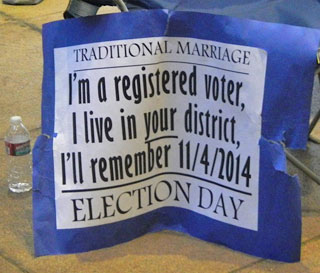 |
Not giving up. We have a feeling that more of these will be seen around the Hawaii State House -- and across the state!
(There's even a website:
www.Hawaii
Remembers.com)
In fact, signs like these should be up across America. |
| |







